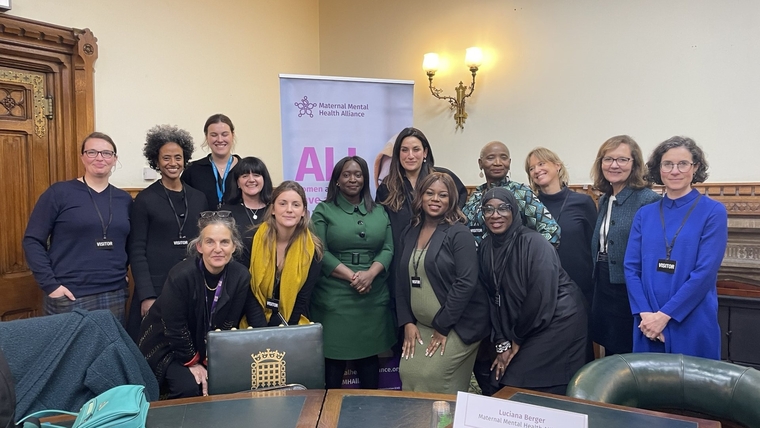Posted By: Amy Tubb
6th December 2023
4 minute read

The Maternal Mental Health Alliance (MMHA) is co-hosting a vital roundtable discussion on Monday 27th November 2023 with Abena Oppong-Asare, Shadow Minister for Women’s Health and Mental Health, and a number of women’s health organisations, to address the urgent need for enhanced maternal mental health care. This event will look at what can be done to improve access to mental health support within maternity and health visiting services for all women. The discussion will also highlight the urgent need to address inequalities which lead to higher levels of risk and poorer experiences of care for Black and minority ethnic women, young mothers, and those facing multiple disadvantages such as domestic abuse, poverty, insecure housing, and addiction.
The case for supporting women’s mental health during pregnancy and after birth could not be clearer and the MMHA wants to see all political parties include maternal mental health in their election manifestos.
Maternal mental health problems are the most common complication of pregnancy and the postnatal period and the human and economic cost of failing to care for women, babies and families affected is undeniable.
According to research by the London School of Economics, untreated maternal mental illness costs the country a staggering £8.1 billion for each annual cohort of births in the UK. Not only that, but suicide remains the leading cause of maternal death in the postnatal period. It is the sad reality that in 2020, women were three times more likely to die by suicide during or up to six weeks after the end of pregnancy compared to 2017-19.
The mental health needs of new and expectant mothers cannot be ignored.
Laura Seebohm CEO of the MMHA, said:
"With at least 1 in 5 women developing a mental illness during pregnancy or postnatally, maternal mental health is a subject that demands immediate and ongoing attention. We are delighted to engage with Shadow Minister Abena Oppong-Asare to address the critical need for improved mental health care within the routine contacts women have with healthcare professionals. We want to see an end to the widening health inequalities in maternal mental health care. We look forward to similar conversations with other major political parties in the coming weeks.”
The MMHA has outlined five key areas requiring attention, and for the postcode lottery to end, to create positive change for all women, babies, and families impacted by perinatal mental illness:
Laura Seebohm, continued:
“Untreated mental illness during pregnancy and after birth can have devastating consequences, but there is a real opportunity for positive change by improving access to high-quality, compassionate care. We want to see this vital area of healthcare get the attention it deserves.”
The MMHA remains steadfast in its commitment to improving maternal mental health care for every woman and family in the UK.
Abena Oppong-Asare, Shadow Minister for Women’s Health and Mental Health, said:
“Too many mothers suffering from poor postnatal mental health are not receiving the care they need. It is tragic that the leading cause of death for new mothers is suicide and deeply worrying that Black, Asian and ethnic minority mothers are most affected by mental ill-health.
“I’m so pleased to join the Maternal Mental Health Alliance (MMHA) and other important voices to discuss these urgent challenges and to share Labour’s plan to tackle the country’s mental health crisis and the vast health inequalities we face."
- End -
For further information on the roundtable discussion or the MMHA, please contact media@maternalmentalhealthalliance.orgor call 0207 117 2875.
MMHA spokespeople are available for comment.
The following organisations will be represented at the roundtable discussion: 5 x More, Birth Companions, Home-Start UK, Institute of Health Visiting, Maternity Engagement Action, Mothers for Mothers, Royal College of Midwives, Royal College of Obstetricians and Gynaecologists, Royal College of Psychiatrists, The Motherhood Group and UK Committee for UNICEF (UNICEF UK).
The MMHA is a charity and network of over 125 organisations, dedicated to ensuring all women and families impacted by perinatal mental health problems have access to high-quality, compassionate care and support. We bring the maternal mental health community together and make change happen by combining the power of real-life experience with clinical and professional expertise.